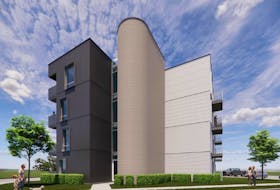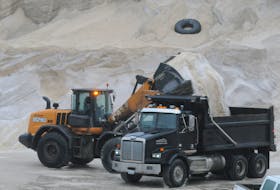Federal cabinet ministers Marc Garneau of Transport and Domenic LeBlanc of Fisheries and Oceans and the Canadian Coast Guard made the announcement at a news conference at Pointe-du-Chêne Wharf in New Brunswick.
Aerial surveillance has determined an unprecedented 80 to 100 North Atlantic right whales are in the Gulf of St. Lawrence, an area that previously saw no more than 10 in any given year.
“The alarming number of deaths has captivated the attention and imagination of Canadians and people around the world,” LeBlanc said. “We will take whatever steps are necessary to ensure the protection of these animals and assist in their recovery.”
The temporary measures are:
- Snow crab fisheries in Area 12 of the Gulf of St. Lawrence are closed.
- Other fixed fisheries in the area have also been closed or hsve delayed openings.
- All ships over 20 metres long will be obligated to slow to 10 knots and smaller vessels will be requested to do the same through an area — subject to change if necessary — that stretches from Gaspésie in the west to Anticosti Island in the east. Failure of large ships to slow to the required speed will result in a fine of up to $25,000 and the name and fine of the offender will be made public.
“We take the situations with the right whales very seriously,” Garneau said.
The Ministry of Transportation, with the assistance of the Canadian Coast Guard, will closely monitor the area to ensure the measures are not being violated, he said.
“I want Canadians to know that before this particular incident we were already taking measures to protect these marine species,” LeBlanc said in response to questions about why actions were not taken sooner.
The ministries will continue to work with their scientific partners and with the National Oceanic and Atmospheric Administration (NOAA) in the United States to create and refine regulations to ensure the protection of wildlife and the environment for generations to come.
The area subject to these temporary regulations will remain under surveillance to study the movement of whales and other marine mammals to get a better understanding of their movement and why it is changing.
The necessary speed reduction will likely have some impact on the profits of cargo, fishing and passenger ships through the effected zone, which normally travel at a speed of about 15 knots. However, the ministers said they are confident that industry officials recognize the importance and urgency of the situation and want to do what they can to help protect the endangered marine mammals.
When asked what the difference is between the measures that have come into effect on Friday and those previously in place, Garneau said, “The difference between what we had before and what we have today is that now it is obligatory.
“We will be evaluating on a real-time basis continuously in the days and weeks to come.”
The measures coming into effect are the same as those already in place in the United States.
“You need to do your homework before you put a measure in place that will have an effect,” Garneau said, emphasizing that a great deal of care and research was put into determining what measures were necessary.
Though the measures put into effect on Friday are only temporary, the ministries are drafting more concrete regulation.
“The protection and safety of the people who work with the animals is of paramount importance,” Leblanc said, though he did not mention if, or when, the ban on disentangling right whales will be lifted.
Six necropsies have been completed thus far, but the exact cause of death of the right whales remains unknown. An official report is expected in the fall, after the whales have migrated south to the Carolinas for the winter.
The World Wildlife Fund has raised concerns that the measures being looked at will still allow oil and gas drilling in the areas of Canadian waters frequented by right whales.








